- Home
- Algernon Blackwood
The Extra Day
The Extra Day Read online
Produced by Juliet Sutherland, Charles Franks and theOnline Distributed Proofreading Team.
THE EXTRA DAY
BY
ALGERNON BLACKWOOD
AUTHOR OF "THE CENTAUR," "A PRISONER IN FAIRYLAND," "INCREDIBLEADVENTURES," ETC.
New York
1915
Set up and electrotyped. Published September, 1915. Reprinted November,1915.
CONTENTS
CHAPTER
I THE MATERIAL
II FANCY--SEED OF WONDER
III DEATH OF A MERE FACT
IV FACT--EDGED WITH FANCY
V THE BIRTH OF WONDER
VI THE GROWTH OF WONDER
VII IMAGINATION WAKES
VIII WHERE WONDER HIDES
IX A PRIEST OF WONDER
X FACT AND WONDER--CLASH
XI JUDY'S PARTICULAR ADVENTURE
XII TIM'S PARTICULAR ADVENTURE
XIII TIME HESITATES
XIV MARIA STIRS
XV "A DAY WILL COME"
XVI TIME HALTS
XVII A DAY HAS COME
XVIII TIME GOES ON AGAIN--
XIX --AS USUAL
XX --BUT DIFFERENTLY!
CHAPTER I
THE MATERIAL
Judy, Tim, and Maria were just little children. It was impossible tosay exactly what their ages were, except that they were just the usualage, that Judy was the eldest, Maria the youngest, and that Tim,accordingly, came in between the two.
Their father did his best for them; so did their mother; so did AuntEmily, the latter's sister. It is impossible to say very much aboutthese three either, except that they were just Father, Mother, and AuntEmily. They were the Authorities-in-Chief, and they knew respectivelyeverything there was to be known about such remote and difficultsubjects as London and Money; Food, Health and Clothing; Conduct,Behaviour and Regulations, both general and particular. Into thesethree departments of activity the children, without realising that theydid so, classed them neatly. Aunt Emily, besides the special dutiesassigned to her, was a living embodiment of No. While Father allowedand permitted, while Mother wobbled and hesitated, Aunt Emily shook herhead with decision, and said distinctly No. She was too full ofwarnings, advice, and admonitions to get about much. She wore goldglasses, and had an elastic, pointed nose. From the children's point ofview she must be classed as invalid. Somewhere, deep down inside them,they felt pity.
The trio loved them according to their just deserts; they grasped thatthe Authorities did their best for them. This "best," moreover, wasdone in different ways. Father did it with love and tenderness, thatis, he spoilt them; Mother with tenderness and love, that is, she feltthem part of herself and did not like to hurt herself; Aunt Emily withaffectionate and worthy desire to see them improve, that is, shetrained them. Therefore they adored their father, loved their mother,and thought highly--from a distance preferably--of their aunt.
This was the outward and visible household that an ordinary person,say, a visitor who came to lunch on Sunday after church, would havenoticed. It was the upper layer; but there was an under layer too.There was Thompson, the old pompous family butler; they trusted himbecause he was silent and rarely smiled, winked at their mischief,pretended not to see them when he caught them in his pantry, and neveronce betrayed them. There was Mrs. Horton, the fat and hot-temperedfamily cook; they regarded her with excitement including dread, becauseshe left juicy cakes (still wet) upon the dresser, yet denied them theentry into her kitchen. Her first name being Bridget, there wasevidently an Irish strain in her, but there was probably a dash ofFrench as well, for she was an excellent cook and _recipe_ was hermaster-word--she pronounced it "recipee." There was Jackman, the nurse,a mixture of Mother and Aunt Emily; and there was Weeden, the HeadGardener, an evasive and mysterious personality, who knew so much aboutflowers and vegetables and weather that he was half animal, half bird,and scarcely a human being at all--vaguely magnificent in a sombre way.His power in his own department was unquestioned. He said little, butit "meant an awful lot"--most of which, perhaps, was not intended.
These four constituted the under layer of the household, concealed fromvisitors, and living their own lives apart behind the scenes. They werethe Lesser Authorities.
There were others too, of course, neighbours, friends, and visitors,who dwelt outside the big iron gates in the Open World, and who enteredtheir lives from various angles, some to linger, some merely to showthemselves and vanish into mist again. Occasionally they reappeared atintervals, occasionally they didn't. Among the former were ColonelWilliam Stumper, C.B., a retired Indian soldier who lived in the ManorHouse beyond the church and had written a book on Scouting; a namelessStation-Master, whom they saw rarely when they accompanied Daddy to theLondon train; a Policeman, who walked endlessly up and down the muddyor dusty lanes, and came to the front door with a dirty little book inhis big hands at Christmas-time; and a Tramp, who slept in barns andhaystacks, and haunted the great London Road ever since they had oncehanded him a piece of Mrs. Horton's sticky cake in paper over the oldgrey fence. Him they regarded with a special awe and admiration, notunmixed with tenderness. He had smiled so nicely when he said "Thankyou" that Judy, wondering if there was any one to mend his clothes, hadalways longed to know him better. It seemed so wonderful. How could helive without furniture, house, regular meals--without possessions, in aword? It made him so real. It was "real life," in fact, to live thatway; and upon Judy especially the impression was a deep one.
In addition to these occasional intruders, there was another person, anAuthority, but the most wonderful Authority of all, who came into theirlives a little later with a gradual and overwhelming effect, but whocannot be mentioned more definitely just now because he has not yetarrived. The world, in any case, speaking generally, was enormous; itwas endless; it was always dropping things and people upon them withoutwarning, as from a clear and cloudless sky. But this particularindividual was still climbing the great curve below their horizon, andhad not yet poked his amazing head above the edge.
Yet, strange to say, they had always believed that some such personwould arrive. A wonderful stranger was already on the way. They rarelyspoke of it--it was just a great, passionate expectancy tucked away inthe deepest corner of their hearts. Children possess this sense ofanticipation all the world over; grown-ups have it too in the form ofan unquenchable, though fading hope: the feeling that some day or othera Wonderful Stranger will come up the pathway, knock at the door, andenter their lives, making life worth living, full of wonder, beauty,and delight, because he will make all things new.
This wonderful stranger, Judy had a vague idea, would be--be like atleast--the Tramp; Tim, following another instinct, was of the opinionhe would be a "soldier-explorer-hunter kind of man"; Maria, if shethought anything at all about him, kept her decision securely hidden inher tight, round body. But Judy qualified her choice by the hopefulassertion that he would "come from the air"; and Tim had a secretnotion that he would emerge from a big, deep hole--pop out like abadger or a rabbit, as it were--and suddenly declare himself; whileMaria, by her non-committal, universal attitude, perhaps believed that,if he came at all, he would "just come from everywhere at once." Shebelieved everything, always, everywhere. But to assert that belief wasto betray the existence of a doubt concerning it. She just lived it.
For the three children belonged to three distinct classes, withoutknowing that they did so. Tim loved anything to do with the ground,with earth and soil, that is, things that made holes and lived in them,or that did not actually make holes but just grubbed about; mysterious,secret things, such as rabbits, badgers, hedgehogs, mice, rats, hares,and weasels. In all his games the "earth" was home.
Judy, on the other hand, was indub
itably an air person--birds amazedher, filling her hungry heart with high aspirations, longings, anddesires. She looked, with her bright, eager face and spidery legs,distinctly bird-like. She flitted, darted, perched. She had what Timcalled a "tweaky" nose, though whether he meant that it was beak-likeor merely twitched, he never stated; it was just "tweaky," and Judytook it as a compliment. One could easily imagine her shining littleface peeping over the edge of a nest, the rest of her sitting warmlyupon half a dozen smooth, pink eggs. Her legs certainly seemed stuckinto her like pencils, as with a robin or a seagull. She adoredeverything that had wings and flew; she was of the air; it was herelement.
Maria's passions were unknown. Though suspected of being universal,since she manifested no deliberate likes or dislikes, approving allthings with a kind of majestic and indifferent omnipotence, theyremained quiescent and undeclared. She probably just loved theuniverse. She felt at home in it. To Maria the entire universebelonged, because she sat still and with absolute conviction--claimedit.

 Day and Night Stories
Day and Night Stories Four Weird Tales
Four Weird Tales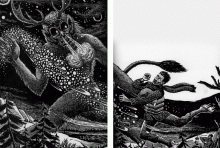 The Wendigo
The Wendigo Three More John Silence Stories
Three More John Silence Stories The Garden of Survival
The Garden of Survival The Extra Day
The Extra Day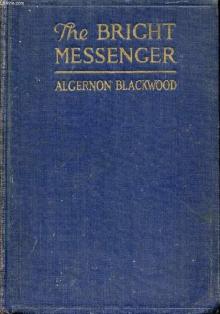 The Bright Messenger
The Bright Messenger Collected Works of Algernon Blackwood
Collected Works of Algernon Blackwood The Empty House
The Empty House Three John Silence Stories
Three John Silence Stories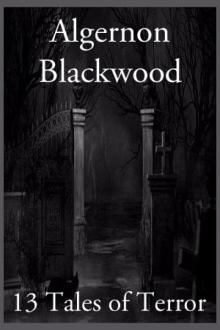 13 Tales of Terror
13 Tales of Terror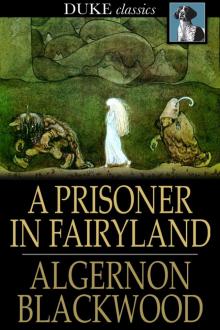 A Prisoner in Fairyland
A Prisoner in Fairyland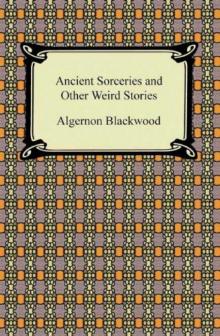 Ancient Sorceries And Other Weird Stories
Ancient Sorceries And Other Weird Stories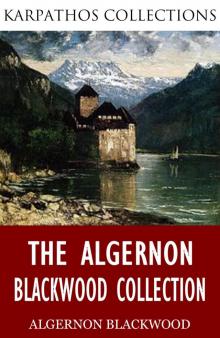 The Algernon Blackwood Collection
The Algernon Blackwood Collection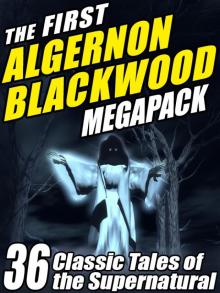 The First Algernon Blackwood Megapack: 36 Classic Tales of the Supernatural
The First Algernon Blackwood Megapack: 36 Classic Tales of the Supernatural John Silence, Physician Extraordinary
John Silence, Physician Extraordinary The Second Algernon Blackwood Megapack: 28 Classic Tales of the Supernatural
The Second Algernon Blackwood Megapack: 28 Classic Tales of the Supernatural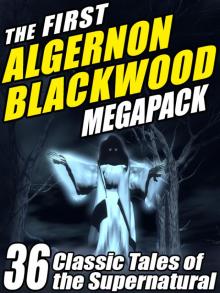 The First Algernon Blackwood Megapack
The First Algernon Blackwood Megapack The Second Algernon Blackwood Megapack
The Second Algernon Blackwood Megapack